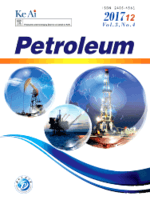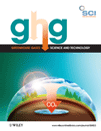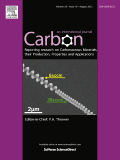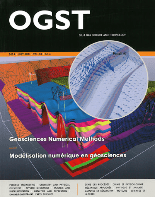
Carbon Capture Science & Technology
Scope & Guideline
Innovating for Impact: Your Gateway to Carbon Capture Advances
Introduction
Aims and Scopes
- Carbon Capture Technologies:
The journal emphasizes the development and optimization of various carbon capture technologies, including post-combustion capture, direct air capture, and chemical looping systems, targeting improved efficiency and cost-effectiveness. - Material Science for Carbon Capture:
A significant focus is on the synthesis and characterization of new materials, such as metal-organic frameworks (MOFs), ionic liquids, and advanced polymers, which are crucial for enhancing carbon dioxide adsorption and separation processes. - Techno-Economic Assessments:
The journal publishes research that evaluates the economic viability and environmental impact of carbon capture technologies, providing frameworks for decision-making regarding implementation in various industrial sectors. - Integration with Renewable Energy:
There is a consistent focus on integrating carbon capture systems with renewable energy sources, exploring synergies that can enhance overall sustainability and reduce carbon footprints. - Carbon Utilization and Conversion:
Research on converting captured carbon dioxide into valuable products, such as fuels and chemicals, is a core area, highlighting innovative pathways for carbon utilization that contribute to a circular economy.
Trending and Emerging
- Advanced Membrane Technologies:
There is a growing body of research on advanced membrane materials and processes, including mixed matrix membranes and 2D materials, which are recognized for their potential to enhance separation efficiency and lower energy consumption. - Electrochemical CO2 Reduction:
Electrochemical methods for the reduction of CO2 into valuable chemicals and fuels are gaining traction, showcasing innovative catalytic strategies and materials that promise to revolutionize carbon utilization. - Biomass and Waste Utilization:
Emerging research focuses on utilizing biomass and waste materials for carbon capture and conversion, indicating a shift towards sustainable and circular approaches in addressing carbon emissions. - Techno-Economic Modeling and Optimization:
An increased emphasis on modeling and optimization techniques for carbon capture processes is evident, with researchers utilizing advanced computational methods to enhance system design and economic feasibility. - Interdisciplinary Approaches:
The journal is increasingly publishing interdisciplinary studies that integrate engineering, materials science, and environmental science perspectives, reflecting the complex nature of carbon capture challenges.
Declining or Waning
- Traditional Absorption Techniques:
Research focused on conventional solvent-based absorption techniques, such as amine scrubbing, is declining as newer, more efficient materials and methods emerge, reflecting a shift towards advanced materials and technologies. - Single-Phase Systems:
Publications concerning single-phase carbon capture processes are becoming less frequent, indicating a trend towards more complex, multi-phase systems that offer improved performance and efficiency. - Basic Carbon Capture Mechanisms:
Research centered on fundamental carbon capture mechanisms, such as basic adsorption theories, is waning as the field becomes more application-oriented, emphasizing practical implementations over theoretical studies. - Low-Temperature Capture Technologies:
There is a noticeable decrease in focus on low-temperature capture technologies, as researchers increasingly prioritize high-temperature processes that are seen as more viable for industrial applications.
Similar Journals

Petroleum
Catalyzing knowledge exchange in the dynamic petroleum sector.Petroleum, an esteemed open-access journal published by KEAI PUBLISHING LTD, serves as a premier platform for disseminating high-quality research in the fields of energy engineering, fuel technology, geology, and related earth sciences. Established in 2015, the journal exemplifies innovation and scholarly rigor with a commendable ranking in the second quartile across multiple categories, including Energy Engineering and Geopolitics. With a focus on advancing knowledge and practices in the petroleum sector, it encourages submissions that encompass a broad spectrum of topics from exploration and extraction techniques to environmental impacts and sustainability measures. Based in Beijing, China, this journal's impact is further enhanced by its significant presence in the Scopus database, achieving impressive percentiles, such as the 95th for Geology and 93rd for Geochemistry and Petrology. The open-access model fosters unrestricted global collaboration and accessibility, making the latest research available to a diverse audience of researchers, professionals, and students eager to innovate and lead in the burgeoning energy landscape.

Greenhouse Gases-Science and Technology
Connecting Researchers to Global Environmental ChallengesGreenhouse Gases-Science and Technology, published by WILEY PERIODICALS, INC, is a crucial platform for disseminating innovative research and technological advancements in the field of greenhouse gas management and mitigation. Renowned for its rigorous peer-reviewed content, the journal boasts a respectable impact factor and is indexed in Scopus, ranking within the top quartiles of both Environmental Chemistry and Environmental Engineering. Operating from the United Kingdom since its inception in 2011, the journal has evolved to cover critical topics that address climate change, sustainability, and environmental protection strategies. With continued publication until 2024, it invites contributions from researchers, professionals, and students dedicated to advancing knowledge and solutions related to greenhouse gases. Its commitment to open-access principles enables broader dissemination of groundbreaking findings, ensuring that vital knowledge remains accessible to stakeholders globally.

CARBON
Elevating Knowledge in Carbon ApplicationsCARBON is a leading peer-reviewed journal published by PERGAMON-ELSEVIER SCIENCE LTD, focusing on the realms of Chemistry and Materials Science. With an impressive impact factor, CARBON is ranked within the top quartile (Q1) of both fields in the 2023 Scimago Journal Rank, remarkably securing the 18th position out of 463 in General Materials Science and the 22nd position out of 408 in General Chemistry. Since its inception in 1963, the journal has been dedicated to publishing high-quality research that advances the understanding of carbon-based materials and their applications. Operating from the United Kingdom, CARBON provides an essential platform for researchers, professionals, and students alike to disseminate their findings and innovations. Although not an open-access journal, it offers access options that maintain the integrity and high standards of academic publishing. As a critical resource in its field, CARBON continues to foster scientific dialogue and development, significantly impacting current and future research.

Environmental Chemistry Letters
Transforming research into actionable insights.Environmental Chemistry Letters, published by Springer Heidelberg, stands at the forefront of interdisciplinary research within the field of Environmental Chemistry. Since its inception in 2003, this esteemed journal has provided a dynamic platform for the dissemination of innovative studies and groundbreaking findings, contributing significantly to the understanding of chemical processes affecting the environment. With an impressive impact factor and ranking third out of 147 journals in Environmental Chemistry (98th percentile as per Scopus), it consistently attracts high-quality submissions from researchers around the globe. The journal maintains a Q1 category rank as of 2023, underscoring its prominent position in scholarly discourse. Environmental Chemistry Letters is dedicated to advancing knowledge on contemporary environmental issues, fostering solutions to mitigate chemical pollution, and promoting sustainable practices across various sectors. Researchers, professionals, and students alike will find invaluable resources within its pages as it continues to illuminate the path toward environmental sustainability.

Carbon Letters
Innovating Sustainable Solutions Through Research.Carbon Letters, published by SPRINGER JAPAN KK, is a premier academic journal based in Singapore that focuses on groundbreaking research in the fields of Ceramics and Composites, Energy Engineering, Inorganic Chemistry, Materials Chemistry, and Organic Chemistry. With an exceptional reputation reflected in its 2023 category quartiles, which include Q1 rankings across multiple disciplines, this journal serves as a vital resource for researchers and professionals seeking to stay at the forefront of carbon-related studies and applications. Although it is not an open access publication, Carbon Letters facilitates the dissemination of high-quality research addressing contemporary challenges in renewable energy, sustainability, and environmental engineering, supporting the academic community's efforts in advancing science and technology. The journal has a robust converged period from 2014 to 2024, signaling its ongoing commitment to excellence in academia.

ACS Engineering Au
Advancing Engineering through Chemistry and InnovationACS Engineering Au, published by the American Chemical Society, is an esteemed open-access journal dedicated to advancements in the field of engineering, encompassing a wide range of interdisciplinary studies that merge principles of chemistry with cutting-edge engineering practices. With an E-ISSN of 2694-2488, this journal aims to disseminate significant and innovative research findings that contribute to the development of sustainable technologies and solutions in various engineering domains. Since becoming an open-access journal in 2021, it has fostered greater accessibility and visibility for researchers and practitioners alike, encouraging collaboration and knowledge sharing across the global community. By providing a platform for high-quality research, ACS Engineering Au plays a pivotal role in shaping the future of engineering disciplines, making it an essential resource for academics, industry professionals, and students who are eager to stay at the forefront of engineering advancements.

Oil & Gas Science and Technology-Revue d IFP Energies nouvelles
Driving the Future of Energy EngineeringOil & Gas Science and Technology - Revue d'IFP Energies nouvelles, published by EDP SCIENCES S A, is a distinguished journal in the field of energy science, specifically focusing on the latest advancements in oil and gas technologies. Since its transition to Open Access in 1997, the journal has been dedicated to disseminating high-quality research that addresses the challenges and innovations inherent in energy engineering and fuels. With an ISSN of 1294-4475 and an E-ISSN of 1953-8189, this journal holds a significant position in academic circles, reflecting its contributions to sustainable energy solutions. The journal's rankings in Scopus showcase its impact, particularly in the areas of Energy Engineering and Power Technology (Rank #105/224), Chemical Engineering (Rank #131/279), and Fuel Technology (Rank #51/100). As a pivotal resource for researchers, professionals, and students, it aims to foster knowledge exchange and promote innovative technologies essential for the ongoing evolution of the energy sector.

C-Journal of Carbon Research
Leading the Charge in Carbon Innovations and Environmental SolutionsC-Journal of Carbon Research is an innovative and dynamic journal published by MDPI, situated in the picturesque city of Basel, Switzerland. Launched in 2015 and operating under an Open Access model, the journal aims to promote the dissemination of high-quality research related to carbon science, environmental sustainability, and renewable resources. With a current impact factor reflecting its growing influence in the field, the journal's standing is bolstered by its Scopus ranking, placing it in the 37th percentile in the Environmental Science category. It offers a platform for researchers, professionals, and students alike to engage with cutting-edge studies, reviews, and discussions that contribute to environmental science advancements. As the journal continues its convergence journey from 2022 to 2024, it remains committed to fostering scholarly exchange and interdisciplinary collaboration on pressing carbon-related challenges.

Petroleum Exploration and Development
Advancing the Frontiers of Petroleum SciencePetroleum Exploration and Development is a premier open-access journal published by KEAI PUBLISHING LTD, dedicated to advancing the fields of petroleum exploration and extraction as well as associated technologies. Since its inception in 2008, the journal has established itself as a key resource for researchers and professionals across various disciplines, evidenced by its impressive Q1 rankings in multiple categories including Economic Geology and Energy Engineering. With an impact factor that reflects its high citation rates and academic significance, this journal offers a unique platform for disseminating cutting-edge research related to geological studies, geochemistry, and energy sustainability. By making all its content freely accessible, Petroleum Exploration and Development ensures that its findings are available to a global audience, fostering collaboration and innovation within the community. Researchers, industry professionals, and students will find valuable insights and advancements in the realm of petroleum science, making it an essential part of their academic and professional libraries.

Progress in Energy
Unlocking the Future of Energy Through Open AccessProgress in Energy, published by IOP Publishing Ltd, is an esteemed open-access journal that focuses on cutting-edge research in the field of energy. With its e-ISSN 2516-1083, this journal stands out for its commitment to disseminating high-quality articles that aim to advance the understanding and application of energy technologies and policies. Juggling respectably in the academic arena, it proudly holds a Q1 classification in the energy (miscellaneous) category and ranks 6th out of 73 in the general energy sector, placing it in the top 92nd percentile among its peers, according to Scopus metrics. The journal's scope encompasses a wide range of topics, including renewable energy, energy efficiency, and policy analysis, making it a vital resource for researchers, industry professionals, and students alike. With a publication horizon extending from 2019 to 2024, Progress in Energy invites contributions that push the boundaries of knowledge in energy fundamentals and innovations.